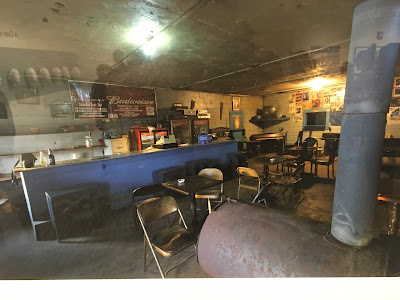** Shortly before his death I had the pleasure to spend an afternoon with Robert Creeley. The Wilderness House Literary Retreat founded by Steve Glines hosted him, and I happened to be on the board for the retreat. The retreat closed after a few years--but we had quite a few interesting guests like Lois Ames, Afaa Michael Weaver, and a number of others...
Robert Creeley at the Wilderness House in Littleton, Mass.
By Doug Holder
It is always exciting to help start a new literary venture. Steve Glines, the founder of the “Wilderness House Literary Retreat” in Littleton, Mass. asked me to be a founding board member last Summer, and finally on Dec. 11 2004 we had our first event. We managed to get the renowned poet Robert Creeley as our first guest. Lo Galluccio, a poet and a friend of mine, joined me and we caught a train out of Porter Square, Cambridge to the hinterlands of Littleton, Mass. Steve Glines met us there and ferried us up to the “New England Forestry Foundation” lodge where the first event was to be held. The actual hunting lodge, where the retreat will be housed hopefully by the late Summer of 2005, is currently being renovated. Later, we inspected the premises, and found it full of promise, not to mention a spectacular view of the nature preserve below.
Lo and I sat down in a spacious room in the NEFF lodge, and enjoyed the crackling fireplace. Creeley was the first to arrive and looked amazingly hale and hearty, and much younger than his 78 years.
The event was advertised as a “chat” with Creeley, and that’s exactly what it was, a “chat,” not a formal lecture. Creeley was free to ramble on about his fascinating career as a literary legend. He talked about the many poets he knew; his years at the experimental “Black Mountain College,” to his experience with Jazz greats such as Miles Davis, to name one illustrious figure.
Creeley who grew up in Acton, Mass. has strong connections to Littleton, the home of the retreat. As a kid he swam at Long Lake which is just down the road from the retreat. Creeley was surprised that the natural beauty of the area has been preserved. Creeley felt that he could now thumb his nose at neighboring Concord that always had a better literary pedigree than Acton and Littleton. Creeley, tongue firmly in his cheek stated; “ I am glad to thumb my nose at Concord.”
Creeley, who taught at the “ Black Mountain College“, which in the 1940’s and 50’s was an innovative avant-garde institution located in North Carolina. Folks like Merce Cunnigham, John Wieners, Robert Motherwell, Buckminster Fuller, Charles Olsen, and others taught there or were students.
Creeley, who attended Harvard, was less than enthusiastic about the years he spent there. He stated: “ Harvard makes everyone feel like an outsider.” He said there was not a welcoming feeling there, and he felt inhibited to approach the formidable and often aloof professors. He said his literature professor at the time excluded the works of Hart Crane, Ezra Pound, and Wallace Stevens, much to his dismay.
Creeley told the audience that at first he wanted to be a prose writer. He laughed: “ I had a naïve sense of supporting a family writing a novel.” However, a publisher told him his novel was all about transitions; nothing ever happened. So Creeley decided to concentrate on Poetry.
Creeley had a plethora of anecdotes about poets he knew like: Allen Ginsberg and Anne Sexton. He recalled Sexton demanding a six-pack of beer before a reading she was to do in Buffalo, NY, that he organized. Ginsberg, commenting on the brevity of Creeley’s poems told him:” What a big book you wrote with such little poems.”
Creeley talked a bit bout his own poetry and process. Surprisingly he said he doesn’t make drafts of poems. If the poem doesn’t work he simply throws it away. He reminded the audience that writing poetry should be fun--not some solemn, painful process. He remembers William Carlos Williams saying “ Maybe we should tell them it’s fun.”
Creeley feels that poetry should be more about the act of “making,” than the final product. He rails against proponents of strict dogma regarding poetic form. He feels there can not be “set” rules for an art form we can not define.
The afternoon went quickly, as Creeley was as an engaging presence. The author Lois Ames was in the audience, and she and Creeley had a fascinating back and forth about Plath and Sexton, both of whom Ames has written extensively about.
Lo and I shook hands with the great man, and of course gave him a few “Ibbetson” books on our way out. We both thanked our lucky charms for this unique experience.












































